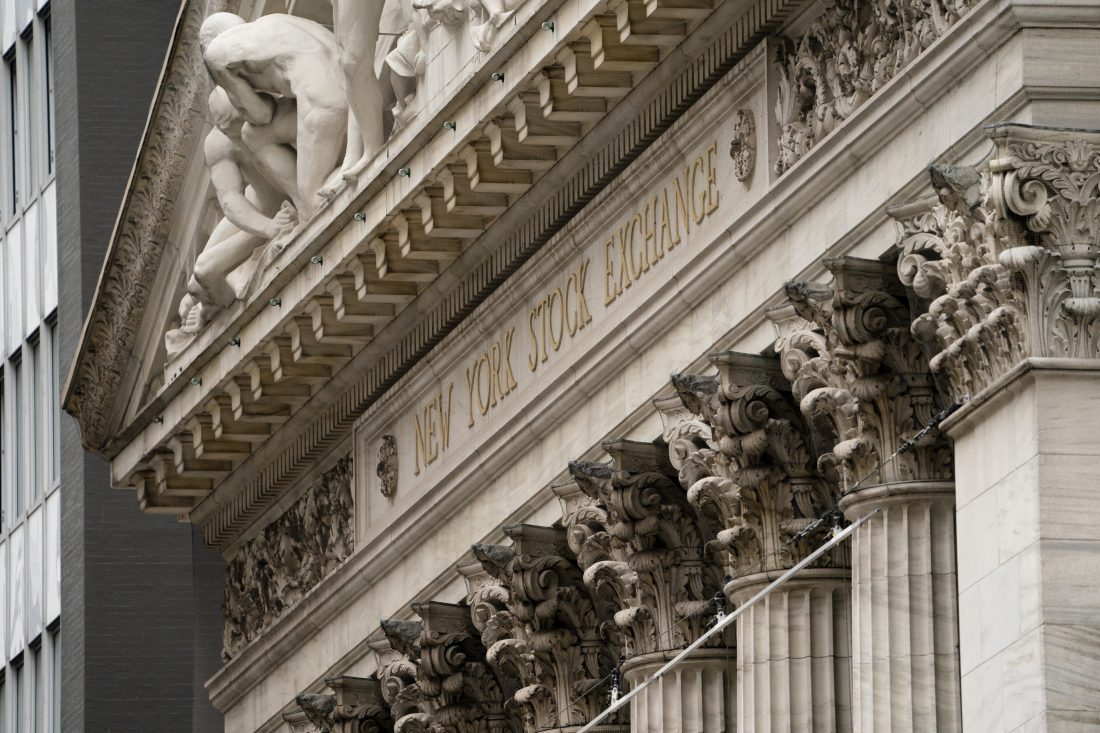Wall Street’s losses worsen as markets tumble worldwide

ap photo The New York Stock Exchange operates during normal business hours in the Financial District in 2021, in the Manhattan borough of New York. Stocks are opening lower on Wall Street, following a highly turbulent week for markets.
NEW YORK — Stocks racked up more losses on Wall Street Monday, leaving the S&P 500 at its lowest point in more than a year.
The sell-off came as renewed worries about China’s economy piled on top of global financial markets already battered by rising interest rates.
The S&P 500 tumbled 3.2 percent, deepening its losses following five straight down weeks, its longest such streak in more than a decade.
The Dow Jones Industrial Average fell 2 percent and the Nasdaq pulled back 4.3 percent as tech-oriented stocks again took the brunt of the selling. Monday’s sharp drop leaves the S&P 500, Wall Street’s main measure of health, down 16.8 percent from its record set early this year.
Wall Street’s pullback followed a worldwide swoon for markets. Not only did stocks fall across Europe and much of Asia, but so did everything from old-economy crude oil to new-economy bitcoin. Bond yields and the price of gold also fell.
Among U.S. stocks, the energy sector, a star performer in recent weeks, accounted for some of the sharpest declines as oil and gas prices fell. Marathon Oil and APA Corp. each sank more than 14 percent.
“Basically, investors are finding it very difficult to find a place to hide,” said Sam Stovall, chief investment strategist at CFRA. “The traditional safe havens, such as defensive sectors or such as bonds, are not doing that well. Commodities are not doing well.”
The S&P 500 fell 132.10 to 3,991.24. The Dow dropped 653.67 points to 32,245.70. The Nasdaq slid 521.41 points to 11,623.25.
Smaller company stocks also fell broadly. The Russell 2000 gave up 77.48 points, or 4.2 percent, to 1,762.08.
Most of this year’s damage has been the result of the Federal Reserve’s aggressive flip away from doing everything it can to prop up financial markets and the economy. The central bank has already pulled its key short-term interest rate off its record low near zero, where it sat for nearly all the pandemic. Last week, it signaled additional increases of double the usual amount may hit in upcoming months, in hopes of stamping out the high inflation sweeping the economy.
The moves by design will slow the economy by making it more expensive to borrow. The risk is the Fed could cause a recession if it raises rates too high or too quickly. In the meantime, higher rates discourage investors from paying very high prices for investments, because investors can get a better return from owning super-safe Treasury bonds than they could just a few weeks ago.
That’s helped cause a roughly 29 percent tumble for bitcoin since April’s start, for example. It dropped 9.7 percent Monday, according to Coindesk.
Worries about the world’s second-largest economy added to the gloom Monday. Analysts cited comments over the weekend by a Chinese official warning of a grave situation for jobs, as the country hopes to halt the spread of COVID-19.
Authorities in Shanghai have again tightened restrictions, amid citizen complaints that it feels endless, just as the city was emerging from a month of strict lockdown after an outbreak.
The fear is that China’s strict anti-COVID policies will add more disruptions to worldwide trade and supply chains, while dragging on its economy, which for years was a main driver of global growth.






